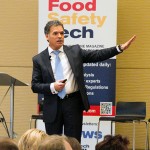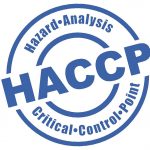Environmental, Social and Corporate Governance (ESG) is a term that is gaining traction among industry, investors and regulators. We spoke with Darin Detwiler, LP.D., M.A.Ed., assistant teaching professor of food policy and director of the Master of Science in Regulatory Affairs of Food and Food Industries program at Northeastern University’s College of Professional Studies in Boston, to learn more about ESG and its growing visibility in the food and beverage industry.
Food Safety Tech (FST): There has been an increase in coverage of ESG in a variety of industries. What is ESG, and do you see the food and beverage industry embracing these ideas?
Dr. Detwiler: When you talk about the Responsible Corporate Officer (RCO) Doctrine, that has received more attention within the food industry, especially with some increases in Department of Justice activity. When there are outbreaks or recalls, people are asking, is this case an RCO case?
When you look at Peanut Corporation of America and the Jensen Brothers, so many key landmark court cases within the food industry, there were RCO violations. The next layer of the onion is Corporate Social Responsibility. And we can talk about that a great deal. This involves looking at the economic, legal, ethical and the philanthropic responsibilities of companies.
It is not specific to food; it is companies and executives overall. But, unlike RCO, corporate social responsibility has been more theoretical. ESG is a way of quantifying and measuring these components of corporate activity.
Join Darin Detwiler, LP.D, at the Food Safety Consortium on October 19-21 in Parsippany, New Jersey.
FST: How might measuring ESG enhance food safety?
Dr. Detwiler: When you look at the Peanut Corporation of America, for example, nearly 100 charges were filed against the CEO, his brother, the QA manager and three plant managers. And those charges were not about making people sick or killing people. Those charges were fraud, conspiracy and obstruction of justice.
If you look at this case in terms of food safety, it doesn’t look like a big food safety case. It’s more of a corporate social responsibility thing, something that was measured and prosecuted outside of the FDA.
When you look at Chipotle, which made news with a series of outbreaks between 2015 and 2018, they made big news in terms of the $25 million penalty—the largest penalty ever imposed in a food safety case. But Chipotle was also fined $1.3 million for child labor law violations in Massachusetts.
Similarly, when you look at Blue Bell Creameries, which was hit with the second-largest fine at $17.25 million for a listeria outbreak in 2015, the former CEO now is facing charges regarding his conspiracy to cover up this information not only from the stockholders but from consumers as well.
The point I’m making is, one could say that child labor law violations have nothing to do with foodborne illness outbreaks. But do they? When you start looking at the bigger picture of ESG data that can be collected by the companies, I think that one could start to see a pattern. That pattern being, if a company has executives that are making decisions that are illegal in one of their houses, they are also taking shortcuts and making poor decisions in terms of food safety. These bigger picture issues of corporate social responsibility could be measured by adequate data collection and monitoring using ESG.
Will an ESG score prevent an outbreak or a recall? We don’t know. But here is what happens when you have an outbreak or a recall. Over time, our options to resolve an issue decrease and our liabilities increase. More people buy the products, more people eat the products and more people become exposed to others who are sick.
The best way to minimize liability and maximize options to resolve an issue is to try to be proactive and even predictive. If we can say that there is a stronger likelihood of this happening here because of these indicators, we can stop before a product goes into a later stage of production or before it goes to distribution. ESG is one potential way to do this.
FST: Should companies be using ESG to vet their suppliers?
Dr. Detwiler: If you are a company that has a lot of ingredients coming from a lot of different suppliers, you want to minimize the risk of getting ingredients from people that you can’t necessarily trust 100%. One proactive approach, perhaps, is to look at ESG scores and say, “Yes, we could save 7% on costs by working with this company, but this company does not have a good record in terms of the ESG metrics.” This transparency is another way to help companies make as clear a decision as possible regarding suppliers and safety.
There are companies right now that are working to create networks of buyers, sellers and distributors, where members share and have access to data that all members provide relating to not only certifications and inspections, but ESG as well, such that there is a more clear understanding of the people that you are partnering with.
Circling back to the Peanut Corporation of America outbreak, one of the things people don’t talk about is that companies that were buying peanut products from Peanut Corporation of America blindly accepted the inspection and audit reports they were receiving. They did not send their own third-party auditors out there. And one of the lawyers did ask, “Why is there no pressure on these companies to be responsible for checking up on their ingredients?” Which is an interesting question to ask. Did the companies skip their due diligence in making sure the processing lived up to the paperwork?
If I’m a food company and I want to partner with or get ingredients from another company, no one is going to say, “I’m OK partnering with a company that’s paying millions of dollars in penalties because of labor violations and fraud.” If you’re only looking at food safety, you’re only looking at one piece of the information you need. Whereas, if we ask bigger questions, which very much align with what ESG would collect, then a clearer picture of a company emerges. And perhaps that’s what we need to start focusing on more.
FST: Where can companies find the criteria for measuring and tracking ESG in their own organizations?
Dr. Detwiler: That’s a great question, and it really is evolving right now. Back when the Chipotle outbreaks were happening, I was contacted by venture capitalists and investment groups and they were saying, “Chipotle was a no-brainer. All you had to do was look at their growth, look at their profits, look at their stock prices and boom, you knew this was a good company.” And they realized they were asking the wrong questions. So, what questions should we be asking to get a bigger or a more accurate picture of a company? In the food industry, it’s not necessarily a one-size-fits-all measure. You have things like organic and kosher, grass-fed and cage-free, but these measures do not pertain to all companies or products. So we have seen some criteria and guidelines, but there are going to be commodity- and company-specific measures to consider as well.
FST: What are the challenges of integrating ESG as part of the regulatory environment and internal company policies?
Dr. Detwiler: There is a sense of, do we really need to burden these companies with collecting this data and having their ESG or corporate social responsibility information exposed to the world? You can look at it like cutting edge technology. It is here. There are plenty of companies that are already using it. And the companies that are currently saying that it’s just too difficult to collect this information, well, on the other side of their operations, when it comes to financials and marketing, it’s amazing how quickly they can adopt the latest technologies to maximize their profitability.
Here’s the deal, I buried my son in 1993 after the Jack in the Box e coli outbreak. We filed charges against Jack In The Box and the parent company and the food maker and the meat supplier. Their lawyers put us through the ringer. They wanted our tax information. They wanted my educational records and they wanted access to my military records. They wanted all kinds of information for their lawyers to determine the value of my son’s life. In that case, the idea of transparency was of value to the industry, but we can’t burden the companies?
Still, the reality is demanding transparency from corporations has been an issue. I was at an event—it was related to blockchain—and one topic that came up among the companies is the risk of being a first adopter. There is a saying, “the first adopter is the first to be crucified.” You put this information out there and something goes wrong and now it’s going to be tied to you. I do understand that concern.
But we have label laws in this country, for example, so demanding or expecting transparency is not new. The challenge is, if we want to promote transparency, do we have any guidelines around it? If it doesn’t have any teeth, then it’s not going to mean anything. Your company may have the same exact score as my company, but what was the authentic collection of data that was used to measure that?
FST: Do you think we will see more requirements for the implementation of ESG from regulators in the near future?
Dr. Detwiler: It is interesting right now with the Officer of the Inspector General evaluating the FDA and whether the FDA did the right thing in terms of what they knew, when they new it and the distance of time between that and when they took action during its inspections and investigation into the Abbott baby formula facility.
People are looking at this stuff more, and the government is starting to evaluate a lot more. They’re not just accepting it as the cost of doing business. I often talk about invisible threats, in terms of things like e coli. We can’t see pathogens, but perhaps something like ESG can make these invisible threats more visible. There are a lot of failures in the farm-to-fork process that can be identified after the fact. ESG many be a tool to provide more clarity before an outbreak or recall occurs.







